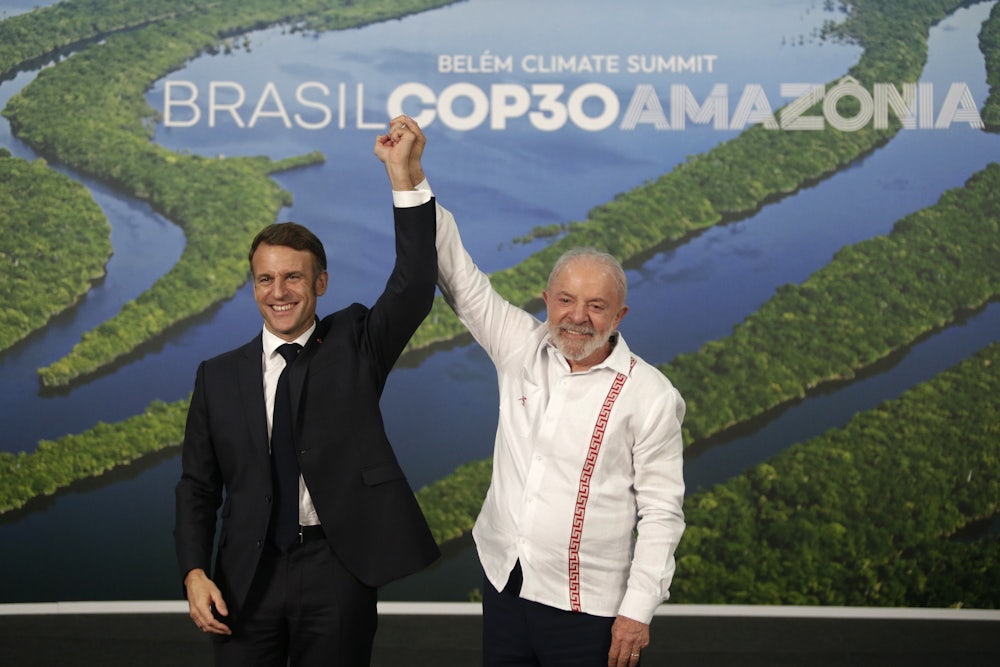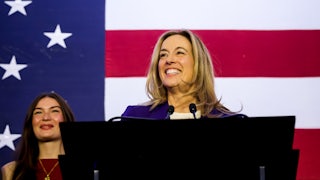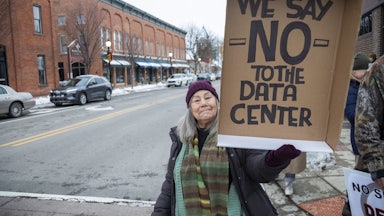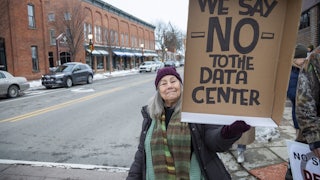In November 2022, having just won the presidency of Latin America’s largest nation for the third time, Brazil’s President-elect Luiz Inácio Lula da Silva spoke at the annual United Nations climate summit known as the Conference of the Parties, or COP. “The world is in a hurry to see Brazil participating again in discussions about the future of the planet and all the beings that inhabit it,” Lula told attendees gathered in the glitzy Egyptian resort town of Sharm El Sheikh. Unlike the far-right extremist he had just defeated, Lula made clear that he took environmental stewardship seriously and promised to place climate action at the center of his administration.
Now, as COP30 opens in Belém, that kind of talk feels quaint. The Trump administration’s various trade wars and military bellicosity have chilled the prospects for multilateralism. It has not merely withdrawn from the global climate change fight—it is pressuring other countries to do likewise. In 2024, 75 world leaders attended COP29. That number was a drastic reduction from the year before. For COP30, fewer than 60 have confirmed their attendance. The United States plans to send no top officials at all. The shared struggle against climate change has been touch and go for years, but the Trump administration might bury it for good.
Lula remains enthusiastic. “We are sure to have the best COP in history,” he proclaimed back in February, insisting that the summit be held in the Amazon. Belém, a thriving port city on the Amazon River, lacks the infrastructure to host large-scale events like COP, usually held in major cities like São Paulo and Rio de Janeiro. The lack of hotels and exorbitant prices have contributed to the relatively light attendance. Indeed, the rush to prepare the city led to many of the problems associated with hosting mega events like the World Cup and the Olympics, with stories about displacements, aggressive escalations in policing, and wasteful spending appearing frequently in the Brazilian press. In August, representatives of 25 countries signed an open letter requesting a site change.
But the president argued that holding COP30 in Belém is an opportunity too important to pass up. “We are forcing the world to look at the Amazon with the eyes that it should. The world will get to know not only the Amazon itself, but also the wonderful and extraordinary people of the Amazon, who deserve support,” he said during a visit last week to an Indigenous village in the same state. Ahead of the leaders’ summit that will precede the formal COP30 negotiations, Lula has called for international support to tackle the regional poverty that often fuels environmental degradation.
Lula can claim some notable environmental successes since returning to power in 2023. His administration has cracked down on illegal deforestation, resulting in the Brazilian Amazon experiencing its lowest forest loss in over a decade. This reduction in deliberate burns and cattle grazing, in turn, drove a 16.7 percent drop in national emissions last year, the largest decline since 2009.
But it’s not all good news. Worsening fires and droughts threaten to undo this progress. Trump’s trade war with China has led the Asian giant to buy even more Brazilian soybeans. This boon for producers raises fresh environmental concerns as increased demand and ever-expanding soy cultivation in Brazil incentivizes further deforestation Furthermore, in late October, Brazil’s environmental regulator approved an exploratory drilling license for Petrobras, the national oil company, at the mouth of the Amazon River. This decision was a long time in the making. (I wrote about it for The New Republic back in 2023.) The timing, however, just weeks before COP30, has drawn sharp criticism. “It’s impossible to imagine a worse moment for this,” Marcio Astrini, executive secretary of the Climate Observatory, told The New York Times.
Environmentalists and Indigenous communities argue that opening a new oil frontier in such a sensitive ecological zone undercuts Brazil’s climate credibility. Lula and several of his closest political allies defend the move as a matter of national energy sovereignty and point to potential revenues to fund green transition efforts.
The decision highlights the tension between Brazil’s climate ambitions and ongoing fossil fuel development. It remains to be seen how exactly the Brazilian government will spin this decision at COP—if mentioning it at all. It could make the argument that Brazil cannot unilaterally disarm: As long as the world is using oil, Brazil can and must pursue all avenues of development. The government could also point to the exploration as a financial windfall for a region with few legitimate sustainable economic options. Either way, the government will be arguing that short-term investments in oil exploration serve the future aim of decarbonization—an argument frequently deployed by politicians across the world trying to justify delaying emissions reductions.
More broadly, it is unclear whether there is any bandwidth in the troubled political present for the type of bold environmental action COP was always meant to encourage. Lula has repeatedly invited Trump to attend the summit, but the American president has not deigned to offer a public response. As CNN’s Andrew Freedman recently noted, the U.S. hasn’t just “estranged itself from official international climate negotiation processes.” It has also put “pressure on trading partners to water down or reject climate commitments.”
Meanwhile, the summit itself is unfolding amid a surge of climate disinformation. Over 1,770 fossil fuel lobbyists attended COP29, a contingent larger than all but three national delegations. In response, COP30 will feature a new Global Initiative for Information Integrity on Climate Change, led by Brazil, to counter the flood of falsehoods and defend the integrity of climate science. This will allow the Lula government to subtly link the fight against climate misinformation to a broader political argument about the rise of the far right worldwide. Of course, as if to prove the point, the Trump administration has positioned the defense of fossil fuel interests as a central element of both its domestic agenda and its broader geopolitical strategy. Countries like Brazil trying to push the world to engage on climate issues are not dealing with indifference from Washington but a forceful coordinated push in the opposite direction.
The global consensus around fighting climate change is fraying elsewhere too. Scrambling to reach a new climate change target ahead of COP, European ministers agreed this week to cut emissions 90 percent by 2040 but weakened the plan by allowing foreign carbon credits and delaying a new carbon market until 2028. This compromise would reduce the emissions cuts that must happen within Europe itself and slow the pace of structural change. It signals exhaustion rather than resolve. This is not encouraging for anyone hoping that COP30 can recharge global climate ambitions. Ultimately, it takes collective effort to make these kinds of summits into more than a stage for virtue signaling from countries with the means and will to attend. Buffeted by genocide, trade wars, institutional uncertainty, and military quagmires, the world doesn’t seem overly focused on what’s happening in the Amazon. Those who profit from environmental decline are surely overjoyed.








